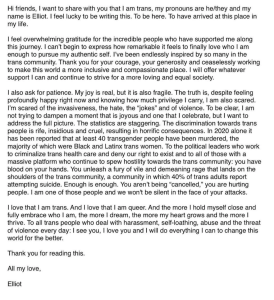On Tuesday, one of the most influential LGBT figures of recent years came out as transgender. Elliot Page, the star of the Umbrella Academy and Juno, posted a heartfelt letter on Twitter and Instagram, in which he announced a name change and the pronouns that he goes by now: he/they.

As an LGBT+ person myself, I know how big coming out is, not only once but a few times and how incredibly daunting that is. I mean I don’t have the same accolades and worldwide fanbase as Elliot but still, it’s no surprise that he didn’t even have a day to enjoy his moment before the press came swarming with negativity. As he said in his statement, he has great fears about coming out: “My joy is real, but it is also fragile … I am also scared, scared of the invasiveness, the hate, the ‘jokes’ and of the violence.”
The violence Elliot talks about isn’t hard to find with the misgendering and deadnaming of trans and NB people and the sexual violence that 45 per cent of trans people have admitted to being subjected to. With the murder of 40 trans people this year alone, you can see why they are scared. This isn’t a world any trans and non-binary people should fear, and they frankly deserve so much better.
Most in the LGBT+ community and beyond have been incredibly supportive, with many queer icons such as Laverne Cox, Ellen DeGeneres, and Patrick Stuart congratulating Page on the milestone. Despite support from their co-workers and fans alike, some people in the community have taken this moment to rain on his parade. The hate comments aren’t hard to find. A common one is “the lesbians have lost a leader”; people are making it sound like he’s died when it is quite the opposite.
Then the deadnaming started. Transphobes tried to “dead name” (use his birth name rather than his chosen one) but couldn’t even get that right, mistakening him for Elaine Page… as in Elaine Page the West End actress from Cats. If you’re going to commit a hate crime at least spell it correctly.

Credit: @theelliotpage

The similarity is astonishing. Despite this being an amusing accident, it is not the only one. Deadnaming is incredibly detrimental to the trans community and the individual. When you refer to a trans/NB person by their dead name, for a start, it’s super invalidating. The first step for many trans people is choosing their name and pronouns. This progression is a large part of identity and social transitioning. They will feel disrespected and saddened that you don’t support them and don’t want to. Not to mention if you do it in front of others, this can “out” someone. This may not be something that they want other people to know because being outed can cause stress. It can also subject a person to harassment and discrimination.
Transgender discrimination is at an alltime high with 46 per cent of surveyed transgender people saying they had been verbally harassed and physically assaulted just for being transgender. This can lead to bias in job opportunities and homelessness, seeing as a large part of the trans community have been homeless at one point and being discriminated against by employers.
Completing a name change can help trans people avoid everyday deadnaming when presenting IDs. However, getting a legal name change can be time-consuming, expensive, and can subject them to further discrimination.
Even after all that, records of a person’s dead name can still be kept in records. With legal name changes being expensive, inaccessible to some people and not effective at eliminating deadnaming, institutions such as the media and education need to support trans people.
Deadnaming is sadly a more common practice in the media than you would think, whether online or onscreen. It can happen to people in the public eye, such as Mr Page. It can also happen to people who have experienced newsworthy harassment and discrimination, including fatal violence. According to The National Coalition for Anti-Violence Projects, 75 per cent of the lives taken in 2017 were those of transgender PoC.
In most cases, at least one media outlet initially referred to the victim with a dead name. News guidelines are now writing in style guides to always use a transgender person’s chosen name, which is a start. These style guides set a precedent to respect transgender people’s names.
To prevent media deadnaming, they could just ask them in an interview. If the person isn’t available, I like to reach out to the people who are closest to them. Families, however, aren’t always supportive, so GLAAD’s helpful MRG encourages us to use the active voice. For example, “the person’s name is X” as opposed to “the person prefers to be called X.”
So, what can we do? Whatever you do, don’t just ask people their deadname. If they’re comfortable, they will tell you but don’t press the issue. Luckily unlearning behaviour is simple. It’s a great way to support for trans people in general but also around you. The best thing is just to ask, really! It’ll be a lot more awkward if you get someone’s name wrong. Use that name for EVERYTHING. You’ll get used to it and signal to the people around you how to correctly refer to your friend. I know it can be hard at first, but it’s okay to mess up. We all make mistakes, and as you learn, it’s likely you’ll get it wrong sometimes. But if we don’t try, how will we know and how will others learn?




